Add this eBook to your basket to receive access to all 72 records. Our indexes include entries for the spelling ackerley. In the period you have requested, we have the following 72 records (displaying 11 to 20): These sample scans are from the original record. You will get scans of the full pages or articles where the surname you searched for has been found. Your web browser may prevent the sample windows from opening; in this case please change your browser settings to allow pop-up windows from this site.  Apprentices registered in Cheshire
(1772) Apprentices registered in Cheshire
(1772)
Apprenticeship indentures and clerks' articles were subject to a 6d or 12d per pound stamp duty: the registers of the payments usually give the master's trade, address, and occupation, and the apprentice's name, as well as details of the date and length of the apprenticeship. There are central registers for collections of the stamp duty in London, as well as returns from collectors in the provinces. These collectors generally received duty just from their own county, but sometimes from further afield. The indentures themselves can date from a year or two earlier than this return. (The sample entry shown on this scan is taken from a Bristol return. Each entry has two scans, the other being the facing page with the details of the indenture, length of service, and payment of duty.) IR 1/58 | Sample scan, click to enlarge

| Inhabitants of Manchester in Lancashire
(1790-1797)
The provincial sections of the Universal British Directory include lists of gentry and traders from each town and the surrounding countryside, with names of local surgeons, lawyers, postmasters, carriers, &c. (the sample scan here is from the section for Hull). The directory started publication in 1791, but was not completed for some years, and the provincial lists, sent in by local agents, can date back as early as 1790 and as late as 1797.
| Sample scan, click to enlarge
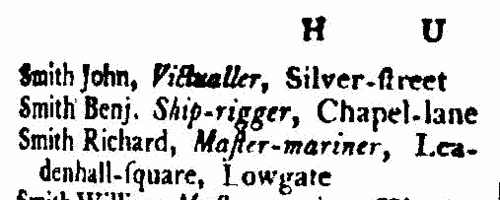
| Boys entering Rugby School
(1803)
This edition of Rugby School Register was published in 1933: the volume covering 1675 to 1857 contains 6480 entries, based on the original school admission registers, but elaborated with general biographical information wherever the editor was able to do so. The entries for the 17th and early 18th centuries are much less detailed than those for later years. The arrangement of the fullest entries was to give the boy's full name (surname first, in bold); whether eldest, second, &c., son; father's name and address as of when the boy entered school; the boy's age at entry and birthday; name of the house (in the school) to which he belonged; then a brief general biography; and date and place of death. | Sample scan, click to enlarge
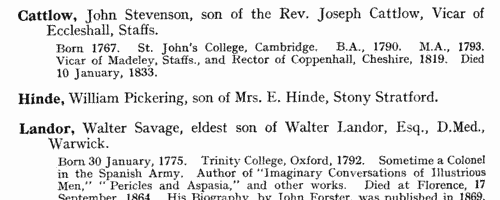
| Tradesmen of Chester
(1392-1805)
Lists of admissions of freemen of the city of Chester from the earliest surviving records to 1805 were compiled by J. H. E. Bennett and published by the Lancashire and Cheshire Record Society from 1906. These lists were extracted from the mayoral yearbooks (dating back to 1392) and twelve freemen's rolls covering 1538 to 1612 and 1636 to 1805; and a list of admissions for 1505-1506 in Harleian MS 2105 (British Library). The record does not become more or less continuous until about 1490: in all, 12,426 freedoms are recorded. Freedom of the city, necessary to practise a trade in the city, could be obtained by birth (in which case the father's name and occupation are usually given); by apprenticeship to a freeman (the master's name and occupation being given); or by order of assembly. Both the freemen and the masters listed are indexed here. The main abbreviations used are: B, freedom taken up by right of birth; I, freedom taken up by right of indenture; M. B., Mayor's Book; *, freedom granted by order of assembly. | Sample scan, click to enlarge

| Bankrupts
(1808-1810)
William Smith's abstracts of bankruptcies for England and Wales from 1 January 1808 to 1 August 1810. Bankruptcy causes abrupt changes in people's lives, and is often the reason for someone appearing suddenly in a different location or in a different occupation. | Sample scan, click to enlarge
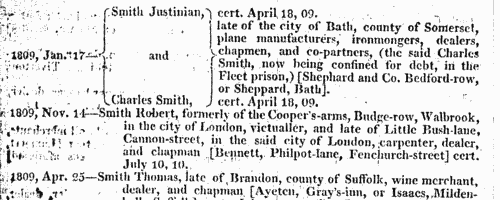
|  Apprentices and clerks
(1805-1811) Apprentices and clerks
(1805-1811)
Apprenticeship indentures and clerks' articles were subject to a 6d or 12d per pound stamp duty: the registers of the payments usually give the master's trade, address, and occupation, and the apprentice's name, as well as details of the date and length of the apprenticeship. 15 January 1805 to 31 January 1811. These are the years after the stamp duty had been abolished, but late taxes were still being raised from existing indentures and aricles. IR 1/39 | Sample scan, click to enlarge

| Deaths, Marriages, News and Promotions
(1812)
Death notices and obituaries, marriage and birth notices, civil and military promotions, clerical preferments and domestic occurrences, as reported in the Gentleman's Magazine. Mostly from England and Wales, but items from Ireland, Scotland and abroad.
| Sample scan, click to enlarge
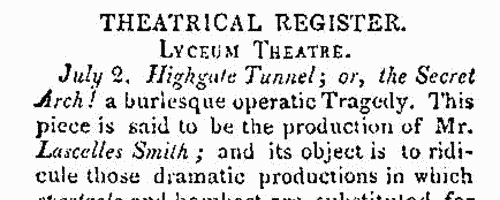
| Subscribers to the Wesleyan Methodist preachers' schools
(1814-1815)
Children of Wesleyan Methodist preachers could be educated by the church at their schools at Kingswood and Woodhouse Grove. These schools were supported by subscriptions and donations raised in local congregations throughout England and Wales, and in some years the individuals making larger donations are listed in the annual minutes, grouped together by congregation. | Sample scan, click to enlarge
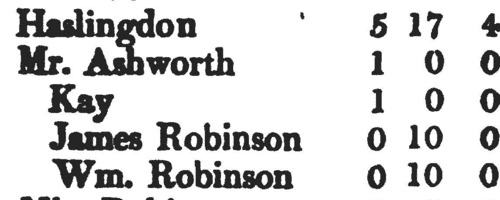
| Chester Freemen Voters
(1818)
Mr John Dodd (D) and Mr George Wildig (W) stood as candidates in 1818 for election by the freemen of the city of Chester as Sheriff of the People. The poll book lists all voters with full name (surname first), address, occupation, and a D or W according to their vote. | Sample scan, click to enlarge
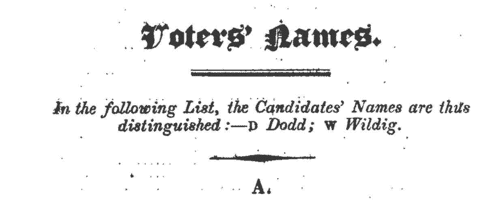
| Workers at McConnel & Kennedy's Cotton Mill, Manchester
(1818)
The minutes of evidence taken before the Lords Committee on the Cotton Factories Bill include a series of reports by medical men as to the general health of the mill workers in April 1818. For each factory there is a complete list of workers, giving full name, age, how long employed in a factory, health (in general terms, such as 'Good' or 'Sickly'), and any chronic disease or 'distortion', cause and duration - with slight variations from report to report. The physicians examined several hundred people each day, asking such questions as 'Have you any swellings or sores anywhere?', 'Are your limbs straight?', 'Have you a good appetite for food?', 'Do you conceive yourself to be in good health?', and all concluded that the health of the mill workers was good, and that the workers were cheerful. This is the report for McConnel & Kennedy's cotton spinning factory in Manchester, 21 April 1818. | Sample scan, click to enlarge

|
Research your ancestry, family history, genealogy and one-name study by direct access to original records and archives indexed by surname.
|












